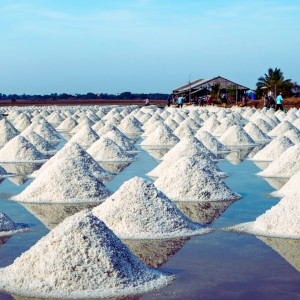 Celtic Sea Salt: A Natural Salt — Not a Mineral Supplement
Celtic Sea Salt: A Natural Salt — Not a Mineral Supplement
Celtic sea salt is often promoted as a natural alternative to regular table salt — and in some respects, this reputation is well deserved. Unlike highly refined supermarket salt, which is stripped of trace minerals and often contains anti-caking agents, Celtic sea salt is less processed and retains small amounts of naturally occurring minerals.
However, a growing number of wellness influencers and health blogs now promote Celtic sea salt as a mineral powerhouse, claiming it provides significant amounts of essential nutrients like magnesium, potassium and calcium. Even the packaging itself can add to the confusion — many brands of Celtic sea salt advertise it as being lower in sodium and higher in minerals, which can be confusing for many consumers. As a result, many people have come to believe that simply adding small amounts of Celtic sea salt to their meals will significantly boost their mineral intake. Others have taken it even further, adding large amounts of Celtic sea salt to water or consuming multiple teaspoons per day, believing this provides meaningful nutritional benefit.
For example, one person I recently spoke to explained she had started using Celtic salt because she believed it would help support her bone health by providing extra calcium. Another person said he was adding up to three tablespoons of Celtic salt to his water every day, hoping to support his blood pressure and mineral balance. But does Celtic sea salt really provide meaningful nutritional benefit?
While it’s true that Celtic sea salt contains trace minerals, the actual amounts are nutritionally insignificant. In fact, to obtain even modest amounts of beneficial minerals, a person would need to consume far more sodium chloride (the main component of dietary salt) than is recommended for long-term health — a practice that could increase the risk of hypertension and other cardiovascular concerns.
Let’s Look at the Numbers
To better understand the actual mineral content, I’ve reviewed several laboratory analyses provided by popular brands of Celtic sea salt. These analyses confirm that while trace minerals are present, they exist in amounts far too small to meaningfully contribute to daily nutritional needs. When compared to recommended daily intakes for essential minerals, it becomes clear that Celtic sea salt’s only significant contributions are sodium and chloride — the same minerals found in regular table salt — along with a small and unreliable amount of iodine.
Here’s a snapshot of what’s actually in a teaspoon (5 grams) of Celtic sea salt, compared to the Adequate Intakes (AI) and Recommended Daily Intakes (RDI) for adult men aged 19-50 years:
| Mineral | Amount per 5g serve (mg) |
% of AI/RDI per teaspoon
|
| Chloride | 2,880 mg | 125% of AI (2,300 mg/day) |
| Sodium | 1,800 mg | 196-391% of AI (460-920 mg/day) |
| Magnesium | 26 mg | 6.5% of RDI (400 mg/day) |
| Calcium | 11 mg | 1% of RDI (1,000 mg/day) |
| Potassium | 6 mg | <0.2% of AI (3,800 mg/day) |
| Iron | 0.79 mg | 10% of RDI (8 mg/day) |
| Copper | <0.125 mg | <7.5% of RDI (1.7 mg/day) |
| Iodine | <0.1 mg | 66% of RDI (150 mcg/day) |
| Manganese | 0.025 mg | <0.5% of AI (5.5 mg/day) |
| Zinc | <0.007 mg | <0.05% of RDI (14 mg/day) |
The Bottom Line
Celtic sea salt can certainly be a good choice if you’re looking for a natural, unrefined salt that avoids unnecessary additives. However, its reputation as a mineral powerhouse does not hold up to scrutiny. While trace minerals are present, the amounts are too low to offer any real nutritional benefit.
Of course, whichever salt you choose, it’s important to remember that excessive sodium intake can contribute to hypertension and cardiovascular risk. According to the National Health and Medical Research Council (NHMRC), the recommended upper limit for sodium intake is 2,300 mg per day for adults — roughly the amount found in just over a teaspoon of salt. This highlights how easy it is to exceed healthy levels, even when using natural, unrefined salt.
Personalised Mineral Support
When it comes to minerals, everyone’s needs are different — and getting the right minerals, in the right forms and amounts, can make all the difference. Whether you’re managing a health condition that may benefit from targeted mineral support, or you’re simply curious about your personal mineral requirements, the qualified health practitioners at Vive are here to help. We offer expert advice, access to premium practitioner-only supplements, and a fully equipped compounding dispensary where we can formulate a custom blend tailored specifically to you.
Feel free to drop into the store for a chat, or book an appointment with a Vive Practitioner here
www.viveclinic.com.au
Peter Christinson
BHSc (Nutritional and Dietetic Medicine)
